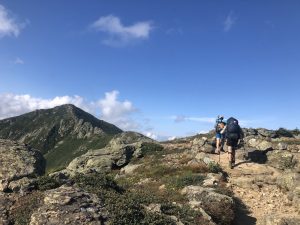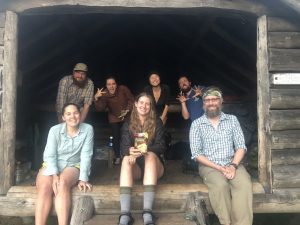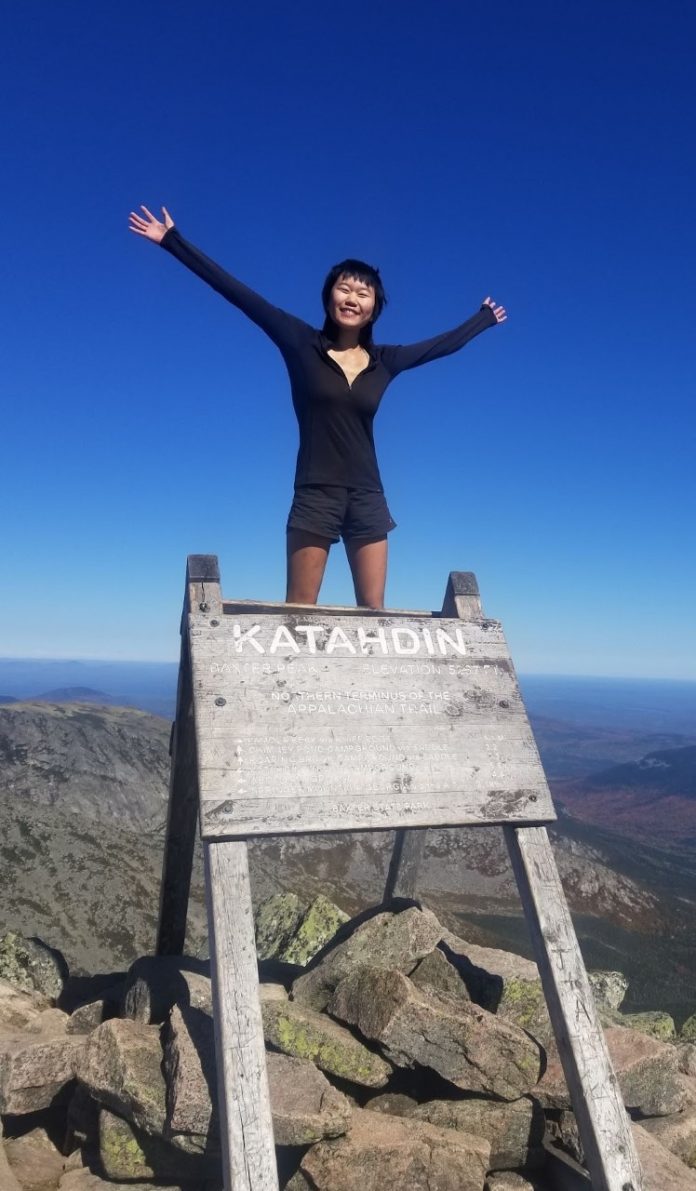Many students at the College of William and Mary enjoy exploring the Lake Matoaka Trails or venturing out a little further to the Powhatan Creek Trail or Waller Mill Park. For many students, that is enough, but not for Emily O’Keefe ’24. She committed to the five and a half month-long endeavor of hiking the entirety of the Appalachian Trail.
Running through 14 states, the Appalachian Trail extends from its southernmost point, Springer Mountain in Georgia, all the way to Mount Katahdin in Maine. It takes around five to seven months to complete the trail, which is roughly 2,190 miles long.
O’Keefe began her hike on April 13 and completed it on Sept. 30. An average day would involve waking up, eating breakfast, preparing all of her belongings and then walking eight to 10 hours every day with a few breaks. After hiking for the day, she would get to a camp, set up, eat, mingle, sleep and then do it all again the next day.
O’Keefe was a Tribe Adventure Program leader at the College of William and Mary, so she had some prior experience and gear. However, she did not do any intense physical training beforehand.
“I feel like I didn’t actually do that much training,” O’Keefe said. “I think the longest backpacking trip I’ve done before the trail was a five-day backpacking trip, so really not too much preparation.”

Committing to such a hike with little preparation is a big decision for anyone to make, but O’Keefe felt like it was a necessary one. In school, O’Keefe was unhappy as a biology major and was overwhelmed with the Residence Assistant lifestyle. According to O’Keefe, she was also a bit of an extremist who was facing an existential crisis surrounding the future. Her extremism could be seen through acts such as shaving her head, living a barefoot lifestyle, no longer listening to music and sleeping in a sleeping bag. All of this accumulated into radical environmentalism, which led them to hike this trail.
“If there’s anything that you can do in society where you’re just almost escaped from society and living among nature, this is one of those things, and I wanted to try it out.”
“The Appalachian Trail was like a form of extremism, I think, that was a pattern for me,” O’Keefe said. “If there’s anything that you can do in society where you’re just almost escaped from society and living among nature, this is one of those things, and I wanted to try it out.”
O’Keefe quickly fell in love with the beauty on the trails and the incredible people she was around. The Mahoosuc Notch, which is considered the most difficult stretch of the entire trail, is a boulder patch that O’Keefe described as an adult jungle gym, and it was one of her favorite parts. She also recalled enjoying the breathtaking views of the White Mountains. The amazing views and landmarks made the hike an unforgettable experience for O’Keefe.

Of course, O’Keefe did face some challenges as there was a lot to be fearful of during this experience. Dead trees falling on her tent at night was a concern after one fell on a friend’s tent. Storms also became a fear after O’Keefe got stuck in the middle of one on a 4000-foot mountain in Virginia while lightning was striking nearby. Additionally, O’Keefe had to skip a small section of the trail in New York as there was a man threatening violence toward hikers. Despite the scary and challenging aspects of this hike, O’Keefe adapted and learned from these experiences.
“Everything is all in the mind,” O’Keefe said. “It’s all about attitude. On the trail, if something was really hard or challenging, I would force myself to say it was easy. And somehow, I think that kind of positive thinking helped me get through it.”
“It’s all about attitude. On the trail, if something was really hard or challenging, I would force myself to say it was easy. And somehow, I think that kind of positive thinking helped me get through it.”
A positive attitude along with new experiences truly made this trip memorable. O’Keefe learned resourceful tricks, such as eating dry ramen as a quick food source, using a swiss army knife to cut nails and a technique for women to pee standing up. She also tried novel hiking tactics to make for a more fun and engaging hike.
“I remembered at some point on the trail someone was talking about the benefits of walking backwards, so for half a mile, I walked backwards on the trail,” O’Keefe said. “It was dizzying and silly, and it surprisingly took a lot out of me, but it’s fun to be able to say that I did it.”
Hiking the Appalachian Trail also allowed O’Keefe to reflect on her life and how she viewed the world.
“I now feel more content with smaller pleasures such as reading for a couple of hours or practicing piano, and I don’t feel the need to battle the world. I’ve come to realize that there is equal, if not greater, value in figuring out how to live moderately as opposed to living in extremes,” O’Keefe said. “Living in extremes is fantastical, and I’m grateful for the opportunity I had to try it out, but living moderately is more practical and requires greater discernment.”
“I now feel more content with smaller pleasures such as reading for a couple of hours or practicing piano, and I don’t feel the need to battle the world. I’ve come to realize that there is equal, if not greater, value in figuring out how to live moderately as opposed to living in extremes.”
Although O’Keefe does not see herself doing this hike or one like it again, she is beyond grateful for the experience. Out of the many lessons O’Keefe learned, living in the present was one she emphasized the importance of, and she hopes that she, and others, can learn to live that way.
“Being present and enjoying everything because it’s all going to end,” O’Keefe said. “On the trail, it felt like it would never end, but it did and now I’m back home. There’s always pain and discomfort and you’ll want the pain and discomfort to end. Like when it’s hot you’ll want it to be cold or when you’re going uphill, you’ll be wanting to go downhill, but vice versa, if you’re going downhill you’ll want to be going uphill. There’s probably going to be a time when you miss what you once thought you didn’t want. So, it’s best to be present and try to accept it.”
CORRECTION (12/06/22): Article was updated by Sarah Devendorf (’25), the Standards and Practices Editor to change the title to “Tribe trek: Emily O’Keefe ’24 hikes entire Appalachian Trail in five and a half months” from “Tribe trek: Emily O’Keefe ’25 hikes entire Appalachian Trail in five and a half months” as O’Keefe is in the class of 2024.

